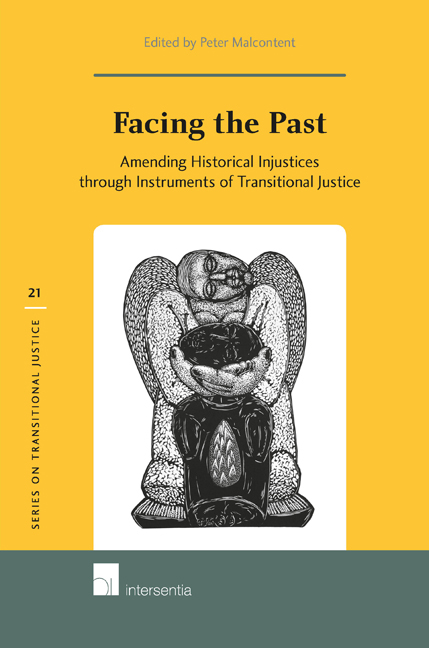Book contents
- Frontmatter
- Acknowledgements
- Contents
- PART I TRANSITIONAL JUSTICE. WHAT'S IN THE NAME?
- PART II RETRIBUTIVE JUSTICE
- PART III RESTORATIVE JUSTICE
- Introduction
- The Whole Truth and Nothing but the Truth? On the Role of Truth Commissions in Facing the Past
- Official Apologies
- Financial Compensation as a Political Process
- Education in the Shadow of History. Education, History Education, and Their Place in Historical Justice
- Governing through Repair. Historical Injustices and Indigenous Peoples in Canada
- PART IV PENDING CASES
- Author Information
The Whole Truth and Nothing but the Truth? On the Role of Truth Commissions in Facing the Past
from PART III - RESTORATIVE JUSTICE
Published online by Cambridge University Press: 15 December 2017
- Frontmatter
- Acknowledgements
- Contents
- PART I TRANSITIONAL JUSTICE. WHAT'S IN THE NAME?
- PART II RETRIBUTIVE JUSTICE
- PART III RESTORATIVE JUSTICE
- Introduction
- The Whole Truth and Nothing but the Truth? On the Role of Truth Commissions in Facing the Past
- Official Apologies
- Financial Compensation as a Political Process
- Education in the Shadow of History. Education, History Education, and Their Place in Historical Justice
- Governing through Repair. Historical Injustices and Indigenous Peoples in Canada
- PART IV PENDING CASES
- Author Information
Summary
INTRODUCTION
On 21 December 2010, in recognition of the significance of knowing the truth about the circumstances and consequences of gross and systematic violations of human rights, the United Nations General Assembly proclaimed 24 March as the International Day for the Right to the Truth concerning Gross Human Rights Violations and for the Dignity of Victims. This day aims to honour victims and pays tribute to and recognises those who have devoted themselves to the promotion and protection of human rights. One year later, on 16 December 2011 the Sri Lankan Lessons Learnt and Reconciliation Commission (LLRC) presented its report to the Sri Lankan Parliament. In a press release of 22 December 2011 the International Crisis Group, a major think tank on conflict and conflict prevention, wrote:
[t]he report acknowledges important events and grievances that have contributed to decades of political violence and civil war in Sri Lanka and makes sensible recommendations on governance, land issues and the need for a political solution. But it fails in a crucial task – providing the thorough and independent investigation of alleged violations of international humanitarian and human rights law that the UN and other partners of Sri Lanka have been asking for. It is now incumbent on the international community, through the UN Human Rights Council, to establish an independent international investigation in 2012.
This is one of the more recent examples highlighting both the potential of a mechanism, set up to deal with human rights violations and international crimes of the past and provide a forum to victims to tell their stories and challenges such mechanisms encounter contextually. Over the past decades, nearly forty truth commissions have seen the light of day and have also disappeared after completing their term. The cradle of truth commissions is found in Latin America, with the commissions in Argentina, Chile and Guatemala amongst the most prominent examples. Later on the model spread over the whole world, and most notably the South African Truth and Reconciliation Commission (TRC) has received lots of attention from around the globe for its reconciliatory and restorative approach. More recently, truth commissions have also been set up to deal with past human rights abuses in Western countries like Canada and the United States.
Information
- Type
- Chapter
- Information
- Facing the PastAmending Historical Injustices Through Instruments of Transitional Justice, pp. 225 - 246Publisher: IntersentiaPrint publication year: 2016
Accessibility standard: Unknown
Why this information is here
This section outlines the accessibility features of this content - including support for screen readers, full keyboard navigation and high-contrast display options. This may not be relevant for you.Accessibility Information
- 4
- Cited by
